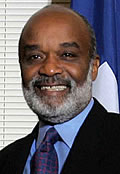Haiti for Haitians
< Previous | Home | Next >
Haiti for Haitians
Haitian Priorities Project promotes a sovereign Haiti.
In law, sovereignty is defined as freedom from external control, or an autonomous state, meaning absolute and unconditional power.
In the despotic form of governments, Sovereignty is generally held by only one man. In Haiti, however, we have a democracy; the power is held by the people constituting a political force called the Nation.
In Haiti we speak of National Sovereignty, thus, sovereignty is then the three branches of power in Haiti working in sync in order to protect the national interest, thus protecting the interest of the people.
It is true that the world is under the threat of globalization invented to describe, at the same time, the internationalization of the economic exchanges and the planetary extension of the communication systems, which means that Haiti is moving indisputably one step closer towards a world governorship.
According to theorists' of globalization, the concept of a sovereign nation is dead, and the concept of sovereignty is obsolete.
The nongovernmental organizations (NGO's) and the multinational firms (MNFS) are, as we know well in the case of Haiti, the new regulators of the world markets and economies.
Globalization certainly created favorable economic advantages for many countries, facilitated exchanges between nations and improved world productivity.
By sharing their resources, many countries succeeded in standardizing their economic policies for the profit of their respective nations.
They decided to restrict the exercise of their sovereignty on the economic front, which by no means meant that they gave up their sovereignty.
No nation voluntarily gives up its sovereignty.
Sovereignty is the essential condition of the exercise of democracy.
The individual cannot agree to subject himself to a decision that in any way interferes with his or her development.
He must thus be able to recognize himself in a way as being part of the institutions.
It is within the framework of national sovereignty that the exercise of the democratic rights or mandate can be carried out.
The right of interference was born within the United Nations, whereas the concept of sovereignty is the heart of its system.
Isn't the goal of the United Nations to protect the Member States from the external interference and to safeguard peace?
In the 1960's, defenders of human rights estimated that the prohibition of any interference did not relate to them since it applied only to the relations of Member State to State.
Then, they chose to legitimate their interference in the name of human rights while going to aid victims of crimes or catastrophes.
In 1988, the UN adopted resolution 43/131 authorizing the intergovernmental and nongovernmental organizations to carry assistance to the victims of the natural disasters and in case of emergencies, thus allowing the UN to interfere legally into the businesses of the other nations.
Dominant countries like the United States, France, Canada, use this right of interference to their profit, thus carrying along their political agendas and provoking economic and social ruin of countries already in crisis.
National sovereignty belongs to the people, it is forbidden for elected officials in Haiti to willingly transfer the people's right to self-determination to foreign authorities (FA's), international organizations(IO's) or NGO's.
We admit needing the assistance of the United Nations as long as they carry out the Haitian people's Mandate.
Our main goal is not to expel MINUSTAH out of Haiti, but rather to use its assistance as it best benefits Haiti and its people.
It is obvious that the socio-economic conditions have worsened since the arrival of the MINUSTHA, and the formula used by MINUSTHA to solve the Haitian problem does not fit. The conditions for the approach used by MINUSTHA do not exist in Haiti as it did in Kosovo.
Haitian Priorities Project simply demands that the group of the five continue to give their support to Haiti while respecting its right to sovereignty and self-determination.
We advocate that they take into account the priorities of the Haitian people and that effective and suitable remedies are given to the ills of Haiti in order to put an end to this national chaos and to give a chance to our courageous nation to live free and independent.
Otherwise, Haiti needs a government capable of creating its own agenda, financed by the Haitian people for the good of the nation.
HPP
Haitian Priorities Project, June 11 2007, 2:32 PM
Start a NEW topic or,
Jump to
previous | Next Topic >
< Previous | Home | Next >
< Previous | Home | Next >

 Rene Preval Making a speech
Rene Preval Making a speech  Rene Preval and Leonel Fernandez
Rene Preval and Leonel Fernandez  Rene Preval and Congressman Hank Johnson
Rene Preval and Congressman Hank Johnson  Rene Preval and Georges W. Bush
Rene Preval and Georges W. Bush  Rene Preval and Peter MacKay
Rene Preval and Peter MacKay  Rene Preval and Condoleezza Rice
Rene Preval and Condoleezza Rice  Rene Preval and Fidel Castro
Rene Preval and Fidel Castro  Rene Preval in Canada
Rene Preval in Canada  Presidents Rene Preval, Raul Castro, Daniel Ortega, and Leonel Fernandez
Presidents Rene Preval, Raul Castro, Daniel Ortega, and Leonel Fernandez  Bill Clinton in Haiti Palais National
Bill Clinton in Haiti Palais National  Woman Chosen As Haiti Prime Minister Nominee
Woman Chosen As Haiti Prime Minister Nominee  Should Michele Pierre Louis B E Pm Of Haiti
Should Michele Pierre Louis B E Pm Of Haiti  Bringthepai Preval Talks About The School Tragedy
Bringthepai Preval Talks About The School Tragedy  Did Obama Respect Preval Summit America 2009
Did Obama Respect Preval Summit America 2009  Bringthepai Preval Kout Soulye
Bringthepai Preval Kout Soulye 

